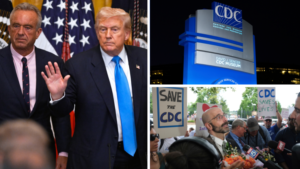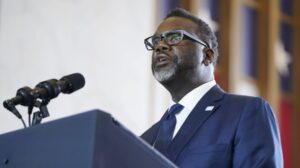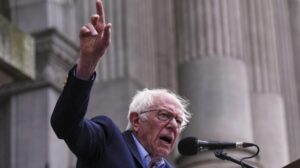Politics
If you suddenly got added to Jaime Harrison’s Substack, you’re not alone
Former DNC Chair Jaime Harrison is jumping on the Substack trend, but he seems to have overlooked the fine print.
Harrison appears to have run afoul of Substack’s terms of service by mass-subscribing his former campaign email list and other personal contacts. Substack’s rules say: “Don’t add people to your mailing list without their consent, and don’t import your contacts list or social graphs.” And Substack emphasizes that subscribers should have “explicitly opted in,” according to a Substack spokesperson.
Harrison recently uploaded those on his 2020 Senate campaign list and other contacts he had collected over the years, though he made that clear to subscribers when he started his Substack. His introductory email last week stated, “As a past member of my email list, you have been automatically subscribed to my new hub on Substack.” Harrison has a Substack podcast where he’s interviewed Democrats including Hunter Biden, Maryland Gov. Wes Moore and Minnesota Gov. Tim Walz, and he also started a paid subscription section for superfans to get early access to podcasts and bonus content.
The way he built his Substack list, however, has attracted negative attention online, with several X users expressing outrage that they were added to his Substack without their permission or even knowledge. One user wrote, “The horrors of giving my email to Democrats never cease. Why tf did I get auto-subscribed to Jaime Harrison’s Substack,” while another wrote, “Just found out I was automatically subscribed to Jaime Harrison’s Substack without my knowledge or consent.”
The spokesperson for Substack, granted anonymity to speak freely, declined to comment on Harrison’s case but said the company’s guidelines “require that any mailing list a publisher imports be made up of people who have explicitly opted in to receive emails from that publication” and that lists purchased or collected without consent (which frequently happens on campaigns) are not permitted. The spokesperson bolded the phrase “explicitly opted in.”
The spokesperson said Substack runs basic checks for issues including invalid addresses but that it doesn’t have a way to verify how emails were collected.
Harrison said in a brief phone interview that he “assumed” his team had followed Substack’s rules but added, “For me, knowing email stuff and all that other stuff, I don’t follow this stuff.” In a follow-up text message, he said he had abided by all Substack policies and that his team “worked directly with Substack to upload our list, which was collected from my Senate campaign and other personal activities.” A spokesperson for Harrison declined to give Blue Light News the name of the Substack representative they dealt with and said such interactions were done only over the phone.
Several other Democratic politicians with Substacks have chosen different ways to build up their newsletter lists. A person familiar with Pete Buttigieg’s Substack, granted anonymity to discuss the matter, said the former transportation secretary is only using organic ways to grow his Substack, which has around 600,000 followers, and that his team doesn’t pull any lists over.
A spokesperson for Sen. Chris Murphy (D-Conn.) said he’s also grown his Substack organically and didn’t think it was necessary to pull subscribers from his campaign email list. The person said the video interviews the senator has done with anti-Trump influencers Jim Acosta and Jennifer Rubin, as well as journalist Anand Giridharadas, have been very helpful in adding new subscribers, now totaling more than 65,000.
Last week, Harrison’s Substack showed that he had a million subscribers, but most of Harrison’s posts have less than a dozen likes. After Blue Light News started asking questions, the number of subscribers became private. A Harrison spokesperson declined to comment on why the subscription number is no longer public.
For years, Democratic consultants have raised concerns that Democratic politicians are exhausting donors with too many emails, but Substack is a new platform on which Democrats can grow — and annoy — people in their orbit.
“Substack prohibits unsolicited spam for a reason,” said Josh Nelson, CEO of progressive ad platform Civic Shout. “Jaime Harrison, as a former DNC chair, should know better than to add people to an email list without their knowledge or consent.”
Another Democratic consultant, granted anonymity because of fear of business consequences, said leaders of many progressive organizations and other influential Democrats now have Substacks that he joked they view as their “retirement plan.”
“It’s so dumb because obviously there’s not enough people on Substack to pay $5 a month for all these people, and they all use tons of organizational resources to pump up their own Substacks, which is so corrupt and such a misallocation of resources,” the consultant said.
Politics
Cleveland’s mayor wants Democrats to know millennials like him are impatient and ready to lead
The age of the millennial politician is here — nowhere more obviously than in city halls around the country. Cleveland Mayor Justin Bibb surprised Ohio’s political establishment in 2021 by soaring to victory at the age of 34. The former Obama intern-turned-Key Bank executive is now the president of the Democratic Mayors’ Association and a rising star within the party.
I met up with Bibb — clad in his signature round tortoiseshell glasses and a slim-cut navy suit suit even on a hot and humid Sunday in July. We talked about his city and its relationship with the federal government — from the impact federal cuts may have on his city’s hospital system to his desire to work with Republicans and President Donald Trump on permitting reform.
Over a plate of mac and cheese at trendy Cleveland bistro Luxe, Bibb said that Democrats at large have missed the fact that millennials are impatient — not willing to wait their turn to run for office, deeply entrepreneurial and chomping at the bit to solve the crises they’ve spent their entire lives navigating.
“When I ran for mayor, a lot of folks — a lot of establishment Democrats in the party — told me to wait my turn,” Bibb explained. “We are impatient about this country, because we know what crises look like … because we’ve experienced them firsthand.”
This conversation has been edited for length and clarity.
You’re from Cleveland.
Born and raised in Cleveland. I live in the southeast side, in the Mount Pleasant/Union Miles neighborhood.
I’m not that familiar with Cleveland. So tell me what that means, vibes- or identity-wise.
It’s got a crazy identity in terms of its history. At the height of Cleveland’s prominence — and we were once the fifth largest city in the United States — it was a Jewish middle-class neighborhood. Then you have white flight, redlining, and it became a Black middle class neighborhood.
To this day, there’s still remnants of that. When I was growing up in the 1990s at the height of the crack epidemic in the city, it still had a strong Black middle class, still strong main streets. And one of the reasons why I ran was to try to reverse that decline.
In an interview earlier this year, you mentioned that housing was a policy space where this Congress might make some progress. Have you seen anything helpful since then?
Nothing yet. And what concerns me is that with the passage of this “big beautiful bill,” it’s adding to the deficit, which is going to lead to an increase in interest rates, which is going to lead to an increase in the cost of buying a home.
If there was one space where I think Trump could have some real bipartisan support, it’s around housing. He’s a builder, right?
I think every mayor or governor you talk to wants to see Congress support us on permitting reform at every level of government. And every mayor or governor you talk to wants HUD to streamline regulations so it’s easier to build in America.
Are there other places you see a missed opportunity, where interests align?
I know that the administration is looking at opportunity zones and … childcare tax credits.
And then on immigration reform … The best thing for us to do to be a competitive economy is to pass common sense immigration reform. So instead of all this theater and chaos and this other bullshit, let’s get back to work and let’s find common sense immigration reform. Everybody wants a secure border, but we also need to give people a pathway to citizenship, because if we don’t, we can’t be globally competitive.
You have connections with many other mayors because of the Democratic Mayors Association. Is there any housing policy you’re seeing in other cities that excites you?
A lot of us right now focus on permitting reform. Cleveland will be launching that effort this fall, where we’re streamlining the process to upload your drawings and to get a permit from City Hall.
Really proud of the work that Mayor Todd Gloria has done in San Diego, where he has really worked quickly to decrease street homelessness in the downtown parts of San Diego. That’s declined over 60 percent since he took office.
I look at what Andre Dickens has done in Atlanta, where he has taken old shipping containers and vacant lots and made it a homeless shelter where people have dignity and support to get the second chance they deserve.
What about some of the cuts that have come out of D.C. recently, on education funding or Medicaid. Are you finding any ways to backfill these cuts?
I think every mayor in the country will agree with this: There is no replacement that we can find to plug in the gaps from the federal government.
Cleveland is home to our only safety net hospital, Metro Hospital, and they could go out of business if these cuts go through. What’s striking is that [Trump] worked to put some provisions in this bill with Republican senators to help rural hospitals, but nothing to support urban hospitals. That’s gonna decimate our public health infrastructure.
And residents in Ohio are going to feel any impacts sooner, because Ohio also rolled back state Medicaid expansion — right?
Correct.
The state cuts … will put a further strain on hospitals like the Cleveland Clinic, Metro Health and emergency hospitals. It’s an issue of public safety, because people may be committing crimes out of survival now, because we no longer have a strong social safety net.
All these things are interconnected. It’s easy for the president and Republicans in DC to try to say, “Democrat-run cities are unsafe.” But they’re the ones making our country less safe by passing these uncompassionate, crazy bills.
I totally understand that you can’t replace the federal cuts. But you said at your State of the City address that you were looking for philanthropic avenues to try to help in other ways.
I’ll be convening healthcare CEOs and hospitals, I’ll be convening my foundation leaders, to figure out what we can do to stand in the gap until we get change from the federal government.
One idea is how do we start to promote more preventative care to make sure that folks aren’t getting sick before they need to go to hospital. I’ll be working with Metro Health Hospital, our local social safety net hospital, to get folks enrolled in the exchanges before these changes occur so they can get the care they need. And I have a mobile health clinic that we deploy at my department of public health as well. So all of the above is on the table.
You’re a millennial. What are Democrats missing about millennials?
That we’re impatient.
Say more.
When I ran for mayor, a lot of folks — a lot of establishment Democrats in the party — told me to wait my turn. We are impatient about this country, because we know what crises look like … because we’ve experienced them firsthand — from 9/11 to the great recession to two wars in Iraq and Afghanistan to the pandemic.
But we’re also the most entrepreneurial generation as well.
Follow-up question — though I don’t know how qualified we (millennials) are to talk for them — about Gen Z. In the 2024 election, nationally, millennials stayed the most blue. Gen Z swung toward Trump.
Gen Z sees a rigged system.
But we (millennials) do too, right? Why does it hit different?
I think for Gen Z … they see all the massive amount of wealth being created because of technology and the proliferation of Amazon, Uber, what have you. They don’t understand why we can’t get our shit together and fix this stuff quickly.
They looked to someone like Donald Trump, who is the disrupter, to fix it.
The reason why he’s losing his base on Epstein and the Epstein files is because they thought they could trust him as the disruptor. He would be transparent. We want transparency … and now they’re not getting that.
What do you want Democrats in D.C. to do more of?
Listen to mayors. We are closest to the challenges and the pain of what this federal destruction looks like, but we’re also closest to the damn solutions. We know how to fix America’s housing problem because we’re doing it. We’re fixing public safety in cities like Cleveland, Baltimore, Atlanta. We know how to create good quality jobs with union and labor being a key partner.
The answer to the Democratic Party’s future and problems will not come from congressional D.C. Democrats. It needs to come from America’s mayors and America’s governors.
Your summer playlist — What are you listening to right now?
Drake is solid. I listen to a lot of Jungle, I love Jungle. I’ve been in a classic Jay Z mode too, recently. I feel like Jay Z [and] Memphis Bleak is like my quintessential growing up in this city [in the] summer vibe that gets me in a good mood.
I just sent my barber my [Spotify] day list. It was called “luxury barber shop Sunday afternoon.” And he’s like “Dude, it’s straight bangers.”
You know he’s playing it at the barbershop right now … And they’re like, “this is the mayor’s playlist.”
[laughing] Exactly, yeah.
Politics
Sunday shows preview: Trump administration faces fallout from CDC leadership shakeup
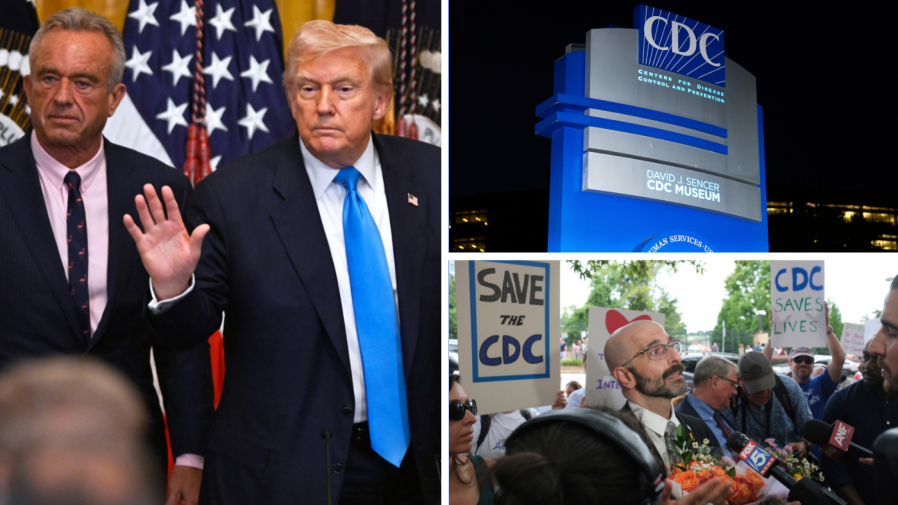
President Trump’s administration is facing fallout from this week’s leadership shakeup at the Centers for Disease Control and Prevention (CDC), where the agency’s director was terminated and other top officials resigned. The president fired Susan Monarez on Wednesday after she clashed with Health and Human Services (HHS) Secretary Robert F…
Read More
Politics
Chicago mayor vows to fight Trump intervention, signs protective order
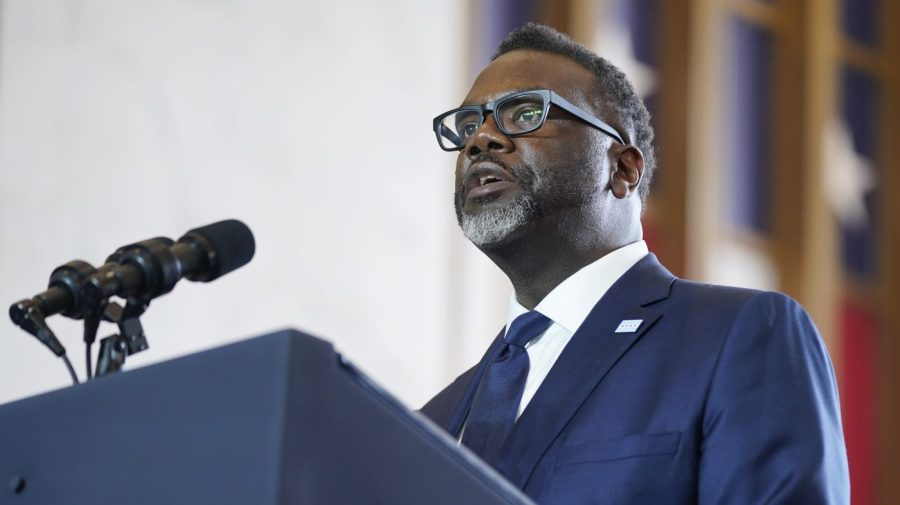
Chicago Mayor Brandon Johnson (D) signed an executive order detailing how the Windy City will attempt to respond to President Trump’s potential deployment of the National Guard. Johnson’s executive order, which he signed on Saturday, established the “Protecting Chicago Initiative” to protect the constitutional rights of Chicago residents amid the “possibility of imminent militarized immigration…
Read More
-
Uncategorized10 months ago
Bob Good to step down as Freedom Caucus chair this week
-

 The Josh Fourrier Show10 months ago
The Josh Fourrier Show10 months agoDOOMSDAY: Trump won, now what?
-

 Politics10 months ago
Politics10 months agoWhat 7 political experts will be watching at Tuesday’s debate
-

 Politics6 months ago
Politics6 months agoFormer ‘Squad’ members launching ‘Bowman and Bush’ YouTube show
-

 Politics10 months ago
Politics10 months agoHow Republicans could foil Harris’ Supreme Court plans if she’s elected
-

 The Dictatorship6 months ago
The Dictatorship6 months agoPete Hegseth’s tenure at the Pentagon goes from bad to worse
-
Economy10 months ago
Fed moves to protect weakening job market with bold rate cut
-

 Politics10 months ago
Politics10 months agoRFK Jr.’s bid to take himself off swing state ballots may scramble mail-in voting


